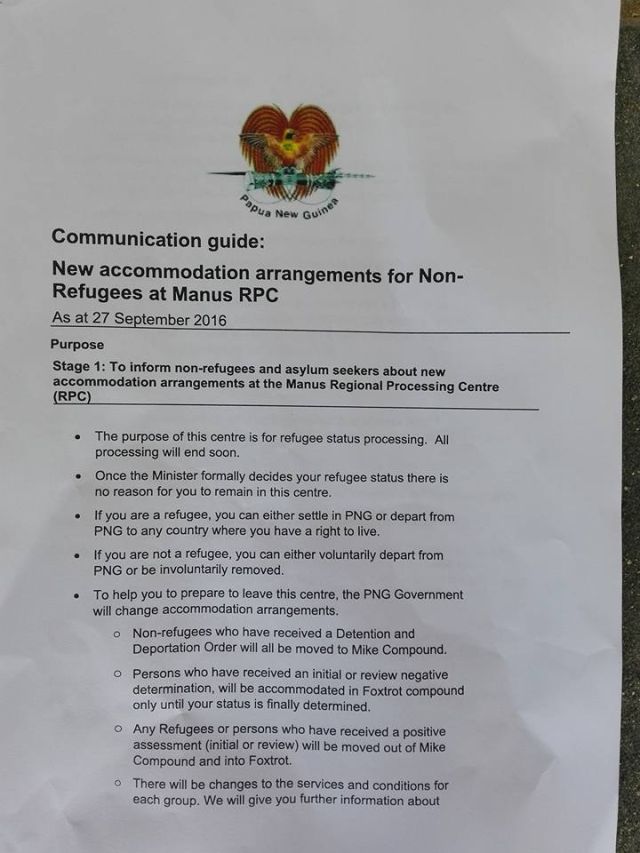
The Papua New Guinea (PNG) government sent a letter to asylum seekers in Manus Island detention centre on September 27 saying the centre will be closed and outlining the next steps.
The letter states: “The purpose of this centre is for refugee status processing. All processing will end soon.”
The letter can be seen as moves by the Australian and PNG governments to close Manus Island detention centre.
This comes in the wake of the April 26 PNG Supreme Court ruling that detaining people in Manus Island is in breach of the country’s constitution and immigration minister Peter Dutton’s announcement on August 18 that an agreement had been reached to close the centre.
There have been ongoing protests in Manus Island detention centre and in January last year refugees staged the largest ever hunger strike, involving 700 people.
Service providers contracted to run the detention centre into 2017 such as Broad-spectrum and Wilson Security have said they will not reapply for contracts.
This comes amid a boycott campaign against the detention centre industry, Wilson in particular have been targeted with activists blocking Wilson car parks and protesting in shopping centres that contract security to Wilson.
The sentiment in Australia to close offshore detention in particular is growing, illustrated by the recent national protests in the wake of the Nauru files.
The options given to refugees in Manus Island detention centre are effectively a death sentence, giving people determined to be a refugee the choice of “settlement in PNG if you are a refugee” or “voluntary removal from PNG”, that is agreeing to go back to the country they have fled from.
Those who have not been determined to be a refugee will face “involuntary removal if you are a non-refugee”. The letter finishes with “no one will be settled in Australia”.
The vast majority — 98% — of the men in detention on Manus Island have been found to be refugees. This has happened in arduous conditions involving a language that is not their first, having to recount the traumatic conditions that forced them to seek asylum and often with a lack of access to adequate legal aid.
A number of men — in April there were 45 — have been refusing to submit their refugee applications to the PNG government, arguing that they want to submit them to Australia or another UNHCR resettlement program country. PNG is not a UNHCR signatory country.
Returning, voluntarily or forcibly to the country they have fled from will most likely mean imprisonment, torture and death. The fact they fled to seek asylum and have told stories of the conditions that led them to flee puts them at even greater risk.
The Australian government carries out its aim of encouraging refugees to go back to the country they have fled from by constructing systems of systemic abuse — aimed at being worse than the conditions people have fled from.
One case is Hamid Khazaei, a 24 year old asylum seeker who cut his foot and was forced to wade through sewage and live in an overcrowded tent in sweltering heat. He was denied appropriate medical treatment and died from septicaemia when the cut became infected.
Another is Reza Berati who was beaten to death by detention centre guards.
The Australian government is also reported to be offering asylum seekers and refugees $20,000 to voluntarily return to the country they fled from. The government is also forcing them to attend meetings with Australian immigration officials that are designed to coerce them into accepting deportation, even if their protection claims are ongoing.
A lot of the refugees on Manus Island have fled Iran, which rejects asylum seekers who are deported to Iran, effectively leaving them in indefinite detention limbo. It shows a complete disregard for non-refoulment by the Australian government.
To accept the other offer of settlement on PNG is to accept living in horrific conditions. Those who have been resettled in PNG are at constant risk of being violently assaulted and robbed and are not given access to health services, in particular mental health services, to help them deal with the trauma of their lives in their home country and detention.
They are only given government support to pay rent and buy food for three months, after which they will often struggle to support themselves. If they do find work, they are often forced to work in worse conditions and are paid less than locals.
PBG is a poor country that simply does not have the resources to settle and provide adequate resources for hundreds of refugees. It also has a government that has been accused of corruption and shoots its own students when they protest.
Many refugees, even after have been offered settlement in PNG, prefer to stay in the detention centre because it has relatively better conditions in terms of safety, shelter, food and access to health care, however inadequate, compared to living in PNG.
The asylum seekers and refugees in Manus Island detention centre have no future. Their only choice is to go back to where they fled from and most likely be tortured to death or try and survive in PNG where they will be denied human rights.
The Australian government must be pressured to abandon its “solution” to closing Manus Island detention centre. Joining the doctors for refugee rallies on November 5 is a good place to continue building the pressure to bring them here.
Like the article? Subscribe to Green Left now! You can also like us on Facebook and follow us on Twitter.